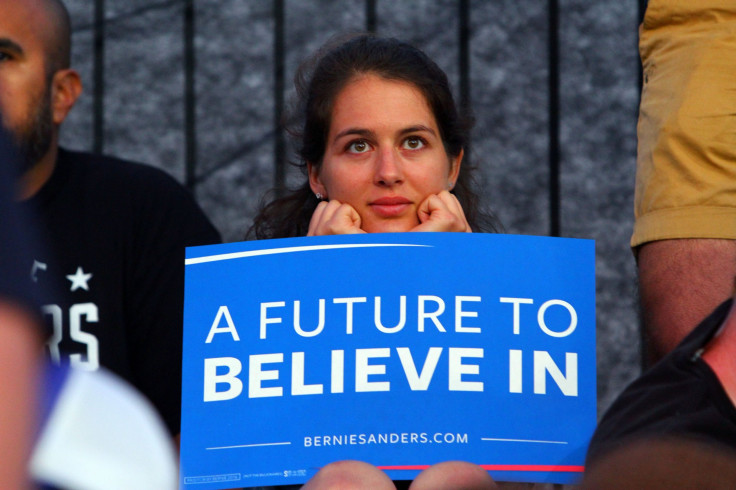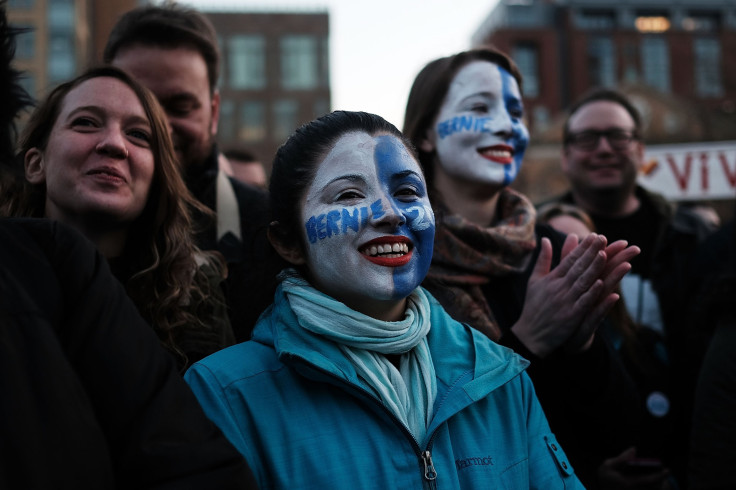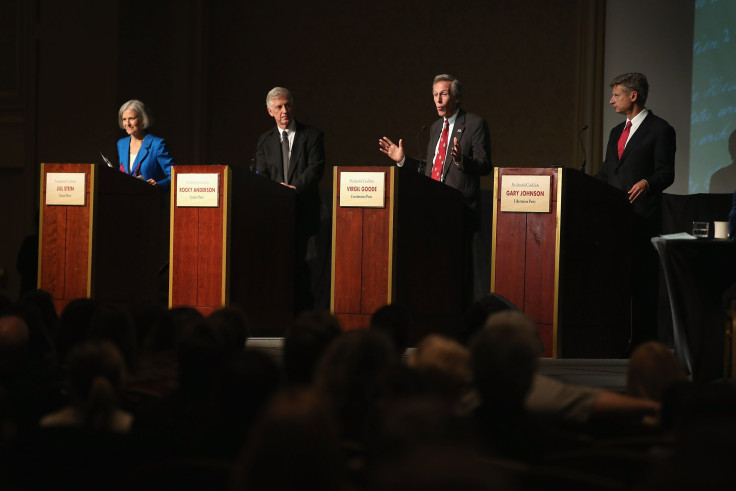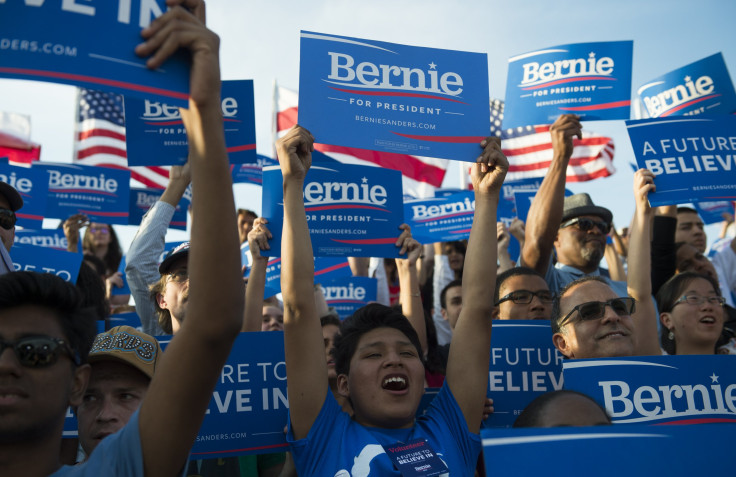Will Bernie Sanders Supporters Vote For Clinton? Why Many Youth Want Jill Stein, Gary Johnson As The Next President

When Andrew Brown and his fellow students at Utah Valley University realized that U.S. Sen. Bernie Sanders was probably not going to be the next president of the United States, they grieved — and got right to work. Gathered in a classroom on campus in Orem, Utah, the UVU Millennials for Bernie Sanders held a vote last week to decide the future of the organization.
"We were kind of holding out, even though our friends were saying, 'He doesn't have a chance; it's a lost cause,'" said Brown, a 27-year-old senior studying political science. "We opened our meeting and said, 'What are we going to do from here on out? Are we going to change the name of our club? Do we want to endorse Hillary Clinton? Do we want to endorse no one? Or write in Bernie Sanders?'"
The 30 members in attendance ultimately chose to relaunch in the fall with a new name and mission in support of Green Party candidate Jill Stein. It's "the best chance that we have to change the system — or make a statement in support of changing the system," Brown said.
Sanders supporters all over the nation are debating how to vote in November now that Clinton has clinched the Democratic nomination. And many of the people talking are millennials, who supported Sanders in droves, steering the senator toward victory in 22 state primary contests or caucuses. With Sanders more or less out of the race, many young people, having spent months railing against career politicians and the establishment, say they're not quite ready to jump ship to the Clinton campaign. Instead, they're looking into third-party candidates like Stein and Libertarian Gary Johnson in hopes of changing the political system.
In the days after Clinton cinched the nomination June 7, International Business Times reached out to more than 65 young Sanders supporters in all 50 states, emailing the leaders of Students for Bernie chapters on college campuses and messaging regional pro-Sanders Facebook pages. We received 29 responses from Sanders supporters ages 18 to 27. Of those voters, 11 specifically said they were considering voting for a third-party candidate. Only six said they definitely would go for Clinton. The rest were undecided — or determined not to vote at all in November.
"We have this moment of real, intense conflict," said Emmy Ham, a 22-year-old Sanders fan who recently graduated from the University of New Hampshire in Durham. "I think a lot of us, through Bernie's campaign, have really unidentified with the Democratic Party in general."
Unless you've been living under a rock for the past year, you know that young people love Sanders. Here's exactly how much: During the primary season, more than 70 percent of Democratic voters under 30 supported the Vermont senator, Vox reported earlier this month. Individual states' numbers are even more impressive. In Illinois, 86 percent of young voters chose him over Clinton, an Illinois native. In Ohio, 81 percent did, according to U.S. News and World Report.
For months, young people flooded Tumblr with posts of Sanders in flower crowns, attended Vampire Weekend benefit concerts and went wild when a bird — nicknamed Birdie Sanders — pestered him at the podium during a speech. They broke turnout records, their enthusiasm inspiring comparisons to President Barack Obama's unprecedented appeal among youth voters in 2008 and 2012.
Unlike Obama, however, Sanders isn't about to emerge victorious from the Democratic National Convention, which this year is scheduled for July 25-28 in Philadelphia. Clinton, the former first lady, U.S. senator and secretary of state, secured the nomination last week after getting the majority of pledged delegates, as well as winning more states and more votes nationwide. As of Tuesday afternoon, with superdelegates added in, she had 2,784 to Sanders' 1,877 delegates.
For Sanders supporters who have decried Clinton as a warmonger, stooge of Wall Street and corrupt career politician, that means it's time to either fall in line with most Democrats or look elsewhere.

Ham said she's waiting for a sign from Sanders before she throws her support behind someone else. "He's created this really loyal, tried-and-true following, and at this point, we're waiting to see if he's on board with this quote-unquote uniting the Democratic Party or if he wants to kind of push against mainstream and the establishment," she said.
The logical choice for most millennials would be to go for Clinton, and to be fair, many will. More than 40 percent of Sanders voters under 30 told YouGov earlier this month they planned to vote for her if Sanders didn't become the nominee or run as an independent — which he shows no indication of doing.
This sort of discussion happens every election year, said Vanessa Williamson, a fellow in governance studies at the Brookings Institution in Washington. There's a pattern: When candidates lose to their rivals, their fans vow not to vote for the winner — and then they change their minds.
"What happens is people forget in the fall," Williamson said. "Democrats vote for the Democrats and Republicans vote for the Republicans."
But anecdotal evidence suggests that might not prove true for the millennial generation, half of which identifies as independent and thousands of whom are first-time voters who don't have strong party loyalty. In the YouGov poll, 32 percent of Sanders supporters under 30 said they'd choose a third-party option if the senator didn't make the ballot.
Among them is Cameron Finley, the 25-year-old chief officer of Aggies for Bernie Sanders at Texas A&M University in College Station, who said he's leaning toward voting for Johnson, the Libertarian Party nominee and former Republican governor of New Mexico, because of his liberal social policies. Johnson has supported gay marriage and legalizing marijuana. In the 2012 election, he came in third place, with just under 1 percent of the vote.
Finley said he's not hesitant to vote for a third-party candidate. "I did it in 2012, and I will continue to do it unless the Democrats or Republicans put up a candidate that I think is worthy of my vote," he said. "I have no love of the two-party system, and I don’t play into the game of voting for the lesser of two evils."
Jeremy Vogel, a 21-year-old senior at the University of Iowa in Iowa City, voted for Stein in 2012. He plans to do it again this November.
Vogel said he likes Stein's stances on education, healthcare and protecting the environment, and he is not worried about the third-party track record.
"My biggest concern about Jill Stein has little to do with her as a candidate, but more to do with how she and her campaign will be treated going forward," said Vogel, the campus chairman for Students for Bernie. "Sadly, I believe that this will be another election cycle when we are told that third-party candidates are only spoilers and that voting for them is the same as not voting at all."

That’s a narrative young people are attuned to, said Abby Kiesa, youth coordinator and researcher at the Center for Information and Research on Civic Learning and Engagement, or Circle, at Tufts University in Medford, Massachusetts. Millennials want to make sure their votes have an impact, and their turnout is dependent upon whether candidates engage them on the issues.
History has proven that young people's votes matter: In 2012, for example, at least 80 electoral votes were dependent upon voters under 30, according to Circle data. Without the youth vote, the swing states of Florida, Ohio, Pennsylvania and Virginia, which supported Obama that year, would have gone red. Mitt Romney could have become president.
But as much as they dislike Clinton and support third parties, all the young Sanders fans IBTimes contacted didn’t want to risk inadvertently helping Donald Trump, the Twitter-loving billionaire who has proposed banning Muslim immigration, building a wall along the border with Mexico and punishing women who get abortions (which he would outlaw).
Take Umaima Koch, an 18-year-old who attends South Dakota State University in Brookings. She supported Sanders, but with his campaign flagging, she said she's had to focus on her priorities. Koch said Trump, who insults women and people of color, isn't fit for the presidency. Clinton, on the other hand, has years of experience.
"Small steps are better than no steps — or worse, regression," Koch said.
That fear could also motivate Kevin Macaraeg, a student at San Francisco State University, to go to the polls for the former first lady in November. Macaraeg said he dislikes Clinton but feels stuck with her, because exploring other candidates this late in the election cycle "can only result in a cartoon character for a president."
It's a harsh truth: No independent has ever won the American presidency.
For many young Sanders supporters, however, getting a victory in the 2016 presidential election is no longer the point. It’s about 2020 — and beyond.
At the University of New Mexico in Albuquerque, 20-year-old Tre Graves said he’s trying to turn the Students for Bernie club into the Progressive Democrats of America. At the University of Michigan in Ann Arbor, junior Nicholas Kolenda wants to help a third party hit the 5 percent threshold for receiving partial public funding in future federal elections. At the University of Central Florida in Orlando, 20-year-old Alex Storer said he and his peers are focusing on getting progressives into Congress who will reform the campaign finance system.
“We’re not going to disband and give up because Bernie’s probably not going to get the nomination,” he said.

© Copyright IBTimes 2024. All rights reserved.






















